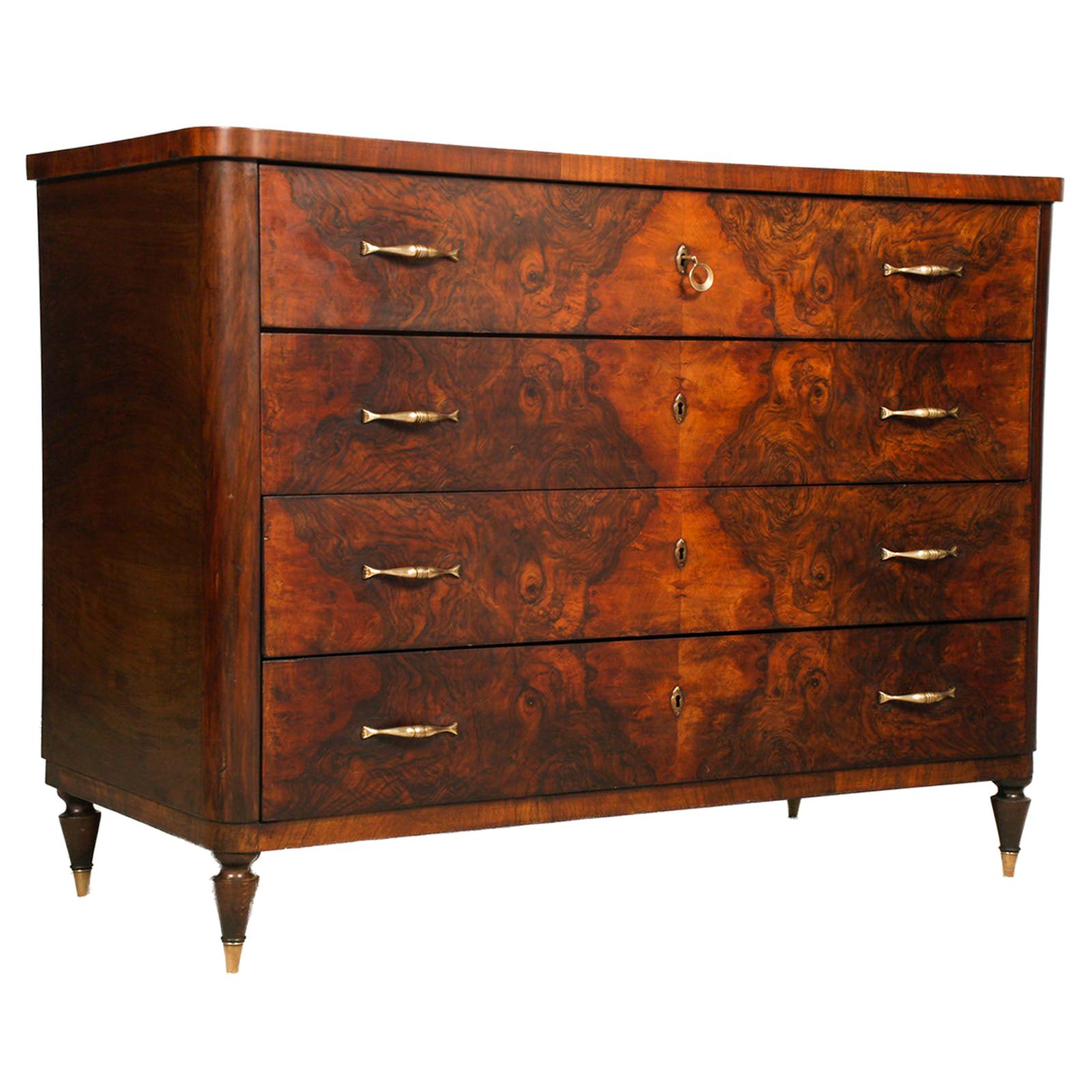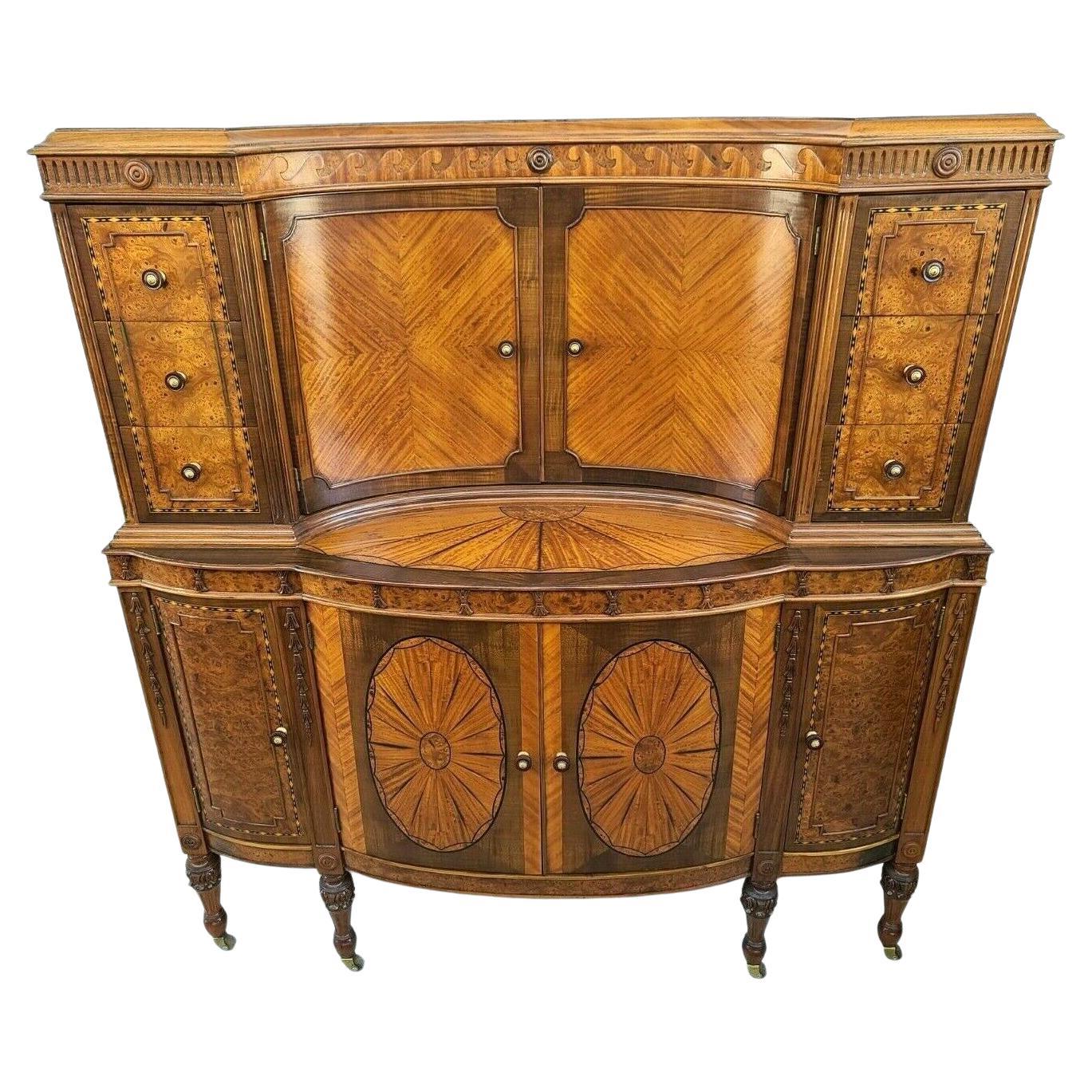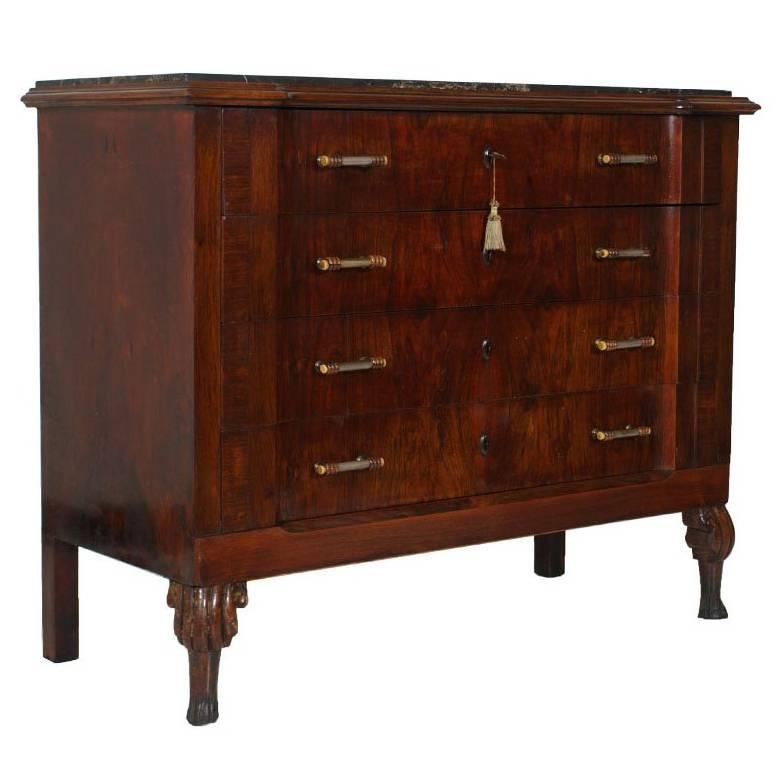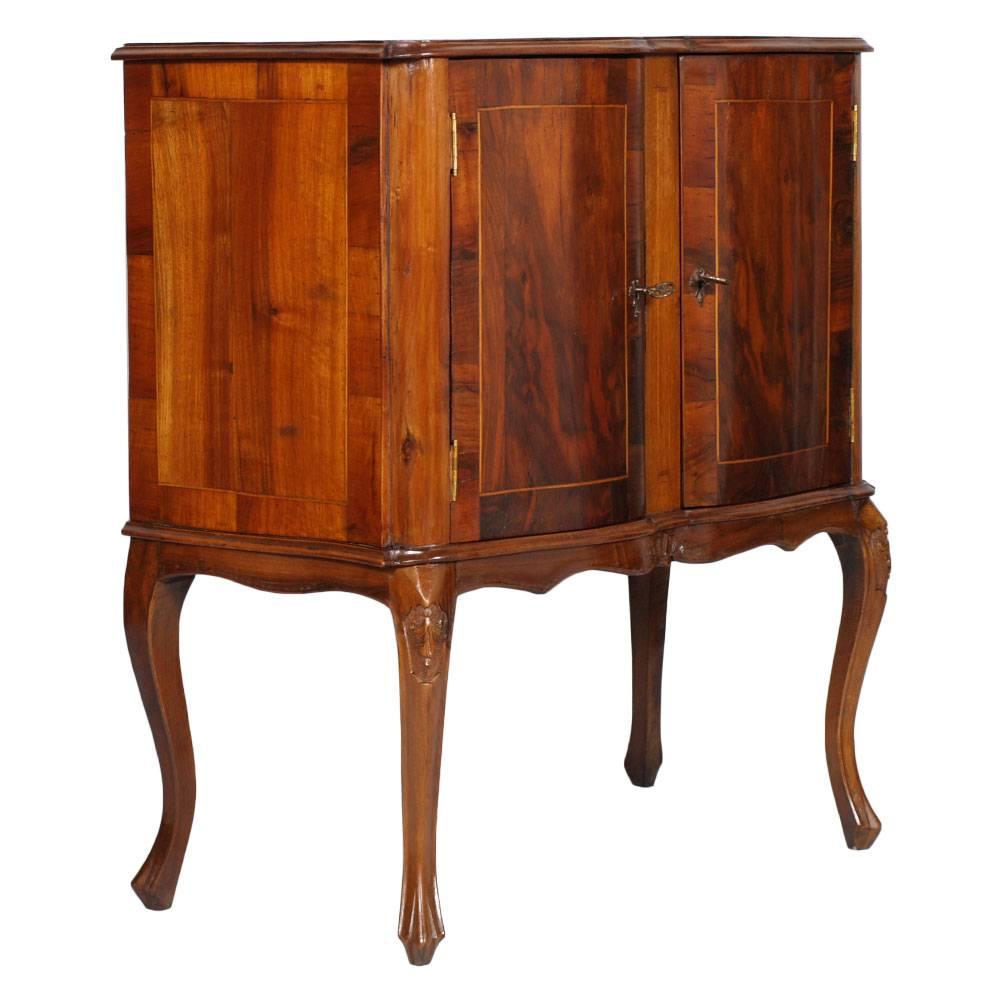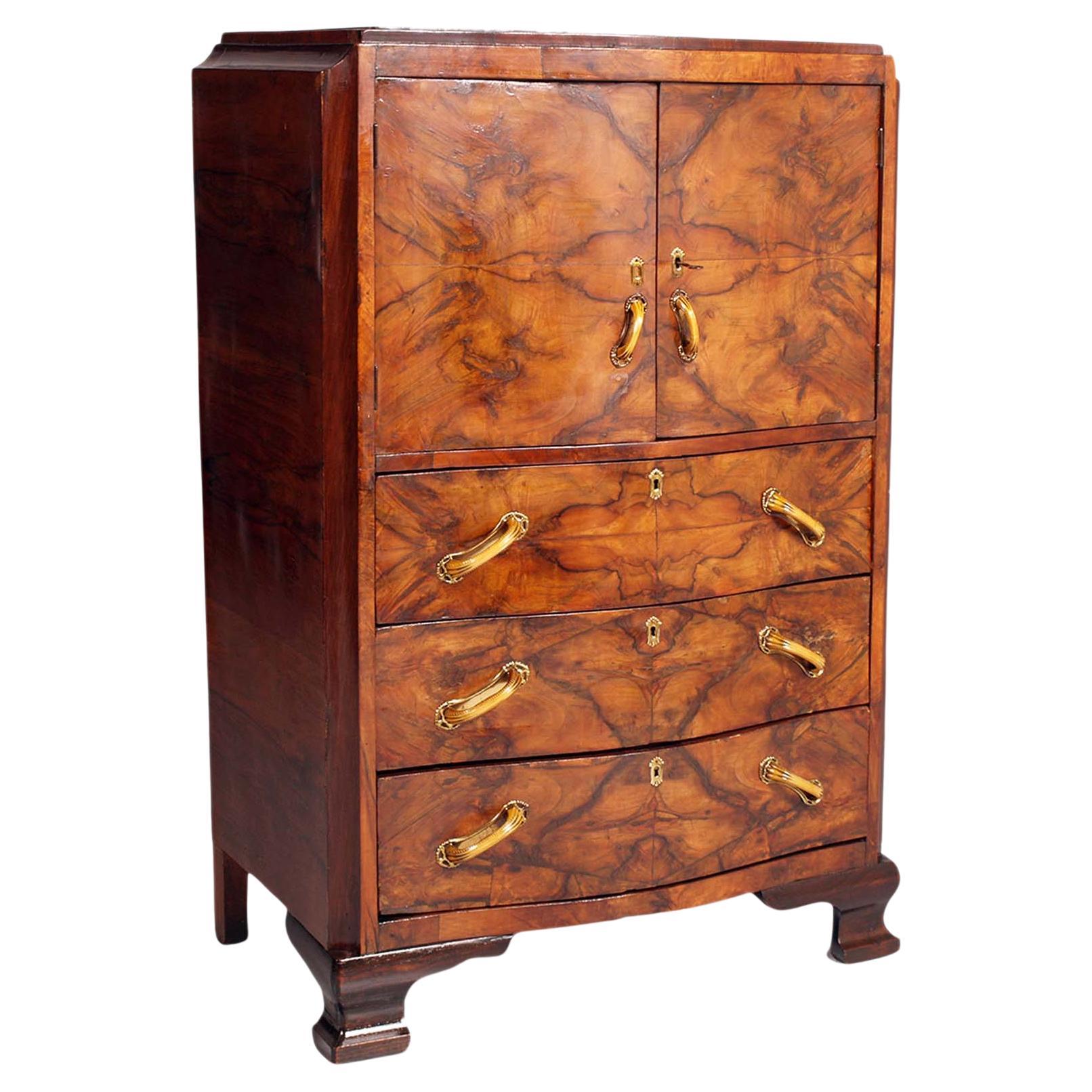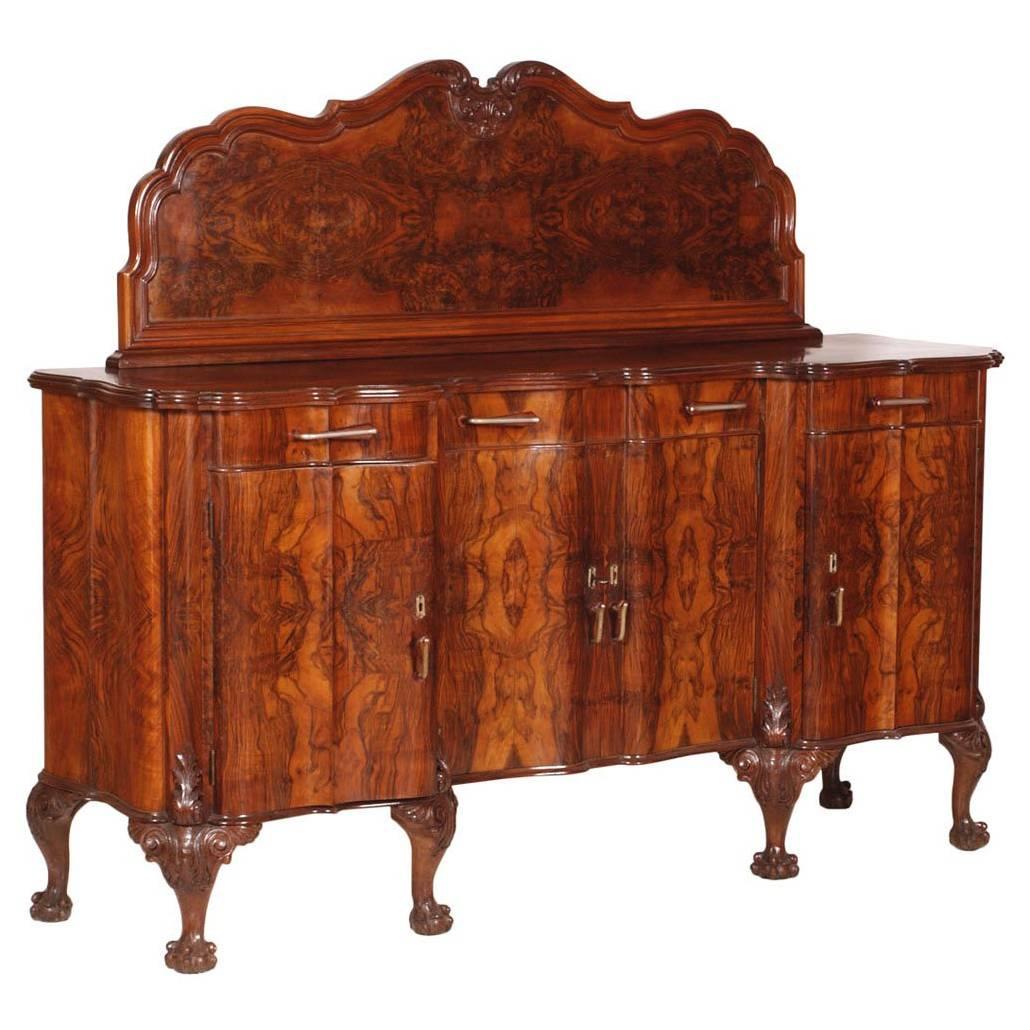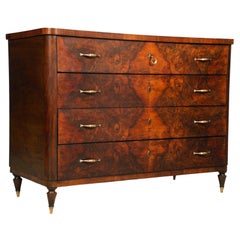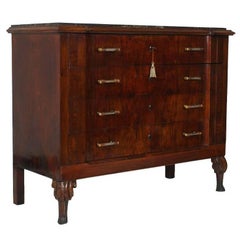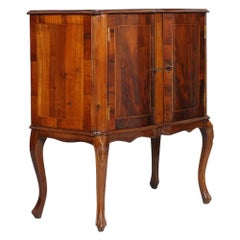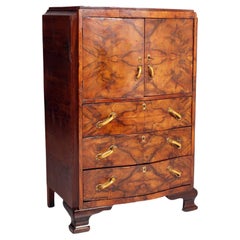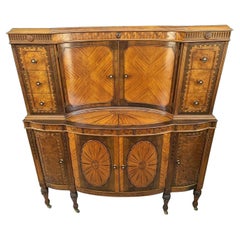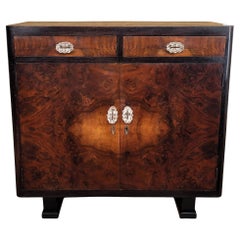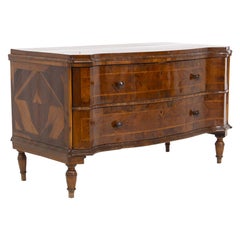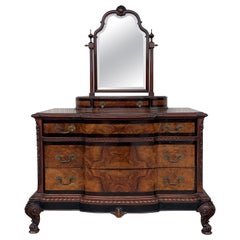Items Similar to 1910s Art Nouveau Dresser Carved Walnut Burl Walnut by Testolini Salviati Venice
Want more images or videos?
Request additional images or videos from the seller
1 of 8
1910s Art Nouveau Dresser Carved Walnut Burl Walnut by Testolini Salviati Venice
$15,137.95
£11,085.61
€12,600
CA$20,606.54
A$23,097.27
CHF 12,026.07
MX$282,027.61
NOK 152,687.44
SEK 144,733.96
DKK 95,889.84
Shipping
Retrieving quote...The 1stDibs Promise:
Authenticity Guarantee,
Money-Back Guarantee,
24-Hour Cancellation
About the Item
Early 20th century Venetian commode Art Nouveau Belle Époque with mirror, carved walnut and burl walnut by Testolini & Salviati , Venice
Precious Bakelite handles fixed with stainless steel.
Handles and original accessories of the period
We can sell the dresser separately from the mirror
Measure cm: H 100 W 124 D 55 the commode
H 80 W 110 D 7 the mirror
About Testolini e Salviati
The Testolini Brothers saw their birth in Venice in 1847. The company grew and became strong their position in the market in a period of enormous cultural and productive ferment for the lagoon capital Venice
The reputation of the company grew thanks to the partnership established with the company since the dawn Antonio Salviati, founded in London in 1866 by Antonio Salviati, the diplomat Sir Austen Henry Layard and the historian William Drake8. This bond was further strengthened in 1896, when for a period of economic stagnation the Salviati, the Testolini, the Jesurum and other smaller companies operating in Venice, decided to merge under the name of Salviati & Co. Jesurum Important to note is that, although formally Testolini the Brothers see disappear from the header your name, the latter from that year is still reported in all commercial guides just below the principal name, with the specification of their production of artistic furniture, given that further shows how the company and its activities were important.
As we have said before, the Testolini creations were also spread globally, and such furnishings have a certain success among the most visible audience: a flashy example is the pair of chairs of our interest once present, along with Other furnishings of Testolini, in the castle of Moulbaox in Belgium, owned by the important family of Counts of Ursel and although purchased when the Brother Testolini had ceased their activity, they had to have a huge resonance of the pair of armchairs chosen by Marilin Monroe for his Home of Los Angeles and immortalized with her by Allan Grant in July 1962, to accompany the article centred on her by Richard Meryman13, (Fig. 13).
- Creator:Testolini & Salviati (Cabinetmaker)
- Dimensions:Height: 39.38 in (100 cm)Width: 48.82 in (124 cm)Depth: 21.66 in (55 cm)
- Style:Art Nouveau (Of the Period)
- Materials and Techniques:
- Place of Origin:
- Period:
- Date of Manufacture:1920s
- Condition:
- Seller Location:Vigonza, IT
- Reference Number:Seller: FA911stDibs: LU249539325001
About the Seller
4.9
Vetted Professional Seller
Every seller passes strict standards for authenticity and reliability
Established in 2017
1stDibs seller since 2017
301 sales on 1stDibs
Typical response time: 1 hour
- ShippingRetrieving quote...Shipping from: Vigonza, Italy
- Return Policy
Authenticity Guarantee
In the unlikely event there’s an issue with an item’s authenticity, contact us within 1 year for a full refund. DetailsMoney-Back Guarantee
If your item is not as described, is damaged in transit, or does not arrive, contact us within 7 days for a full refund. Details24-Hour Cancellation
You have a 24-hour grace period in which to reconsider your purchase, with no questions asked.Vetted Professional Sellers
Our world-class sellers must adhere to strict standards for service and quality, maintaining the integrity of our listings.Price-Match Guarantee
If you find that a seller listed the same item for a lower price elsewhere, we’ll match it.Trusted Global Delivery
Our best-in-class carrier network provides specialized shipping options worldwide, including custom delivery.More From This Seller
View All1920s Art Deco Commode by Gaetano Borsani, Burl Walnut, wox-polished
By Gaetano Borsani
Located in Vigonza, Padua
Italian, 1920s Art Deco commode by Gaetano Borsani, in walnut and burl walnut, with golden brass handle and foot. Polished to wax.
Gaetano Borsani, with his Atelier di Varedo was a n...
Category
Vintage 1920s Italian Art Deco Commodes and Chests of Drawers
Materials
Walnut, Burl
1910s Venetian Eclectic Commode Dresser, carved walnut & Burl Walnut, Marble Top
Located in Vigonza, Padua
1920s Venetian eclectic Bella Epoque period, commode dresser in carved walnut and burl walnut with marble top. Restored and polished with wax. Original handles of the time.
Measures...
Category
Vintage 1910s Italian Baroque Revival Commodes and Chests of Drawers
Materials
Marble
Early 20th C. Serpentin Buffet Cabinet Walnut Hand-Carved & veneer with Inlaids
Located in Vigonza, Padua
Early 20th century Venetian Serpentin buffet cabinet in walnut hand-carved, walnut veneer with light wood threaded inlays. Period Art Nouveau, 1910s.
Measure in cm.: H 94 x W 87 x D...
Category
Antique Early 1900s Italian Art Nouveau Buffets
Materials
Walnut
Art Deco Trumeau Cabinet in Walnut Briar by Atelier di Varedo, Gaetano Borsani
By Atelier Borsani Varedo, Gaetano Borsani
Located in Vigonza, Padua
Art Deco Trumeau Cabinet in Walnut Briar by Atelier di Varedo, Gaetano Borsani, with three external drawers, spacious upper compartment that can be opened with two doors containing t...
Category
Early 20th Century Italian Art Deco Cabinets
Materials
Walnut
1910S Venetian Baroque Credenza, by Testolini & Salviati in carved Walnut & Burl
Located in Vigonza, Padua
Early 20th century Venetian Baroque credenza sideboard buffet in walnut hand carved and burl walnut. Manufacturer Testolini & Salviati.
Measure cm: H 100/154, W 188, D 54.
Category
Early 20th Century Italian Baroque Revival Sideboards
Materials
Walnut, Burl
Art Deco Commode in Burl Walnut attributed Osvaldo Borsani , Atelier Di Varedo
By Atelier Borsani Varedo, Osvaldo Borsani
Located in Vigonza, Padua
Majestic and elegant chest of drawers attributed Osvaldo Borsani designer, produced in the Varedo Atelier , original in every part, with bakelite handles, 1930s Art Deco chest of drawers, commode , in burl walnut with mirror, polished to wax. Excellent condition.
Measures cm: D 53, W 120, H 100.
mirror cm: W 90 H 75.
About Osvaldo Borsani
Osvaldo Borsani (born 1911, Varedo, Italy–died 1985, Milano, Italy) was an Italian designer and architect, born into a family of furniture makers with along and well established artisanal tradition. His father, Gaetano Borsani, owned his own furniture shop, the Atelier di Varedo, where the 16-year-old Osvaldo received his first training. At that time, the designer of the atelier was the architect Gino Maggioni, who brought with him influences of the early 20th century Jugendstil movement from Vienna and who instilled in the young Borsani an appreciation for the arts and crafts and furniture making. Osvaldo Borsani first studied fine arts at Accademia di Belle Arti di Brera in Milan, graduating in 1931, and then pursued studies in architecture at Politecnico di Milano, where he graduated in 1936.
In 1933, two years before graduating as an architect, Borsani designed the Casa Minima project for the V Triennale di Milano (Milan Triennial), along with architects Cairoli and Varisco. This project earned him a silver medal for its Rationalist code and geometries, and he received positive reviews from the critic Edoardo Persico of Casabella magazine.
Villa Borsani And Other Prominent Architectural Work
In 1937, Osvaldo Borsani designed Villa Presenti in Forte dei Marmi, a sea town in Tuscany where the Italian aristocracy and industrial elite would build their houses, a project that displayed the same rationalistic rigor displayed in Casa Minima, but softened by the use of mediterranean finishes and materials.
Villa Borsani designed by Osvaldo Borsani. Varedo, Italy
Villa Borsani. Varedo, Italy
In 1943, Osvaldo designed and built his own house, the Villa Borsani, in Varedo, which, despite being conceptualized under strict Rationalist principles, incorporated objects and art of younger artists that communicate a freer approach to the human expression. The Villa Borsani project involved artists such as Adriano Spilimbergo, Fausto Melotti, Lucio Fontana (who made the ceramic fireplace and the ceramic Madonna), and Agenore Fabbri (who made the bronze statue in the staircase). To this day, Villa Borsani has been preserved with most of its original furniture and it remains with Osvaldo Borsani’s family along with the extensive archives of his work.
Osvaldo Borsani As a Successful Product and Furniture Designer
After Villa Borsani, Osvaldo continued to develop many projects for the Milanese bourgeoisie, frequently with many of the same artists whom he employed for his villa. A particularly strong relationship was the one that Osvaldo developed with artist Lucio Fontana, a close friend since the time of the Accademia de Belle Arti di Brera, and whom Borsani assigned to make a large metal balcony for the Tecno company in 1956.
Osvaldo Borsani’s design work, just as his larger architectural projects, which he also considered design work, very often incorporated elements created by other artists and designers such as: Roberto Crippa, Arnaldo and Giò Pomodoro, Agenore Fabbri, Fausto Melotti, Andrea Cascella...
Category
Vintage 1920s Italian Art Deco Commodes and Chests of Drawers
Materials
Mirror, Walnut, Burl
You May Also Like
Antique c 1900 Art Nouveau Amboyna Burl Hand Carved Walnut Dresser
Located in Lake Worth, FL
Offering one of our recent palm beach estate fine furniture acquisitions Of An
Antique Art Nouveau Amboyna Burl Hand Carved Walnut Dresser
App...
Category
Antique Early 1900s Art Nouveau Dressers
Materials
Walnut, Burl
$3,296 Sale Price
25% Off
1940s Italian Art Deco MidCentury Modern Walnut Burl Brass Sideboard Credenza
Located in Carimate, Como
Very elegant Italian Art Deco Mid-Century Modern sideboard or credenza, in beautiful veneer walnut briar burl wood, two drawers and two doors with shelves completed by nicely carved ...
Category
Mid-20th Century Italian Art Deco Commodes and Chests of Drawers
Materials
Wood
Antique Italian Walnut-Root Veneto Dresser
Located in Milano, IT
Refined and antique Italian chest of drawers of Venetian origin from around 1700. The chest of drawers is finely crafted by master carpenters in...
Category
Antique Early 1700s Italian Baroque Dressers
Materials
Wood, Walnut
$8,169 Sale Price
20% Off
1900s Venetian Baroque Dresser with mirror in Burl Walnut with Ebonized Details
Located in Miami, FL
A elegant serpentine Venetian 1900s Baroque commode chest of drawers in ebonized hand carved walnut and walnut veneered, drawers and top with molded edges , raised on a plinth base r...
Category
Early 20th Century Italian Louis XIV Commodes and Chests of Drawers
Materials
Bronze
$3,430 Sale Price
30% Off
1900s Venetian Baroque Commode Chest of Drawers in Burl Walnut with Ebonized Det
Located in Miami, FL
A elegant serpentine Venetian 1900s Baroque commode chest of drawers in ebonized hand carved walnut and walnut veneered, drawers and top with molded edges, raised on a plinth base re...
Category
Early 20th Century Italian Louis XIV Commodes and Chests of Drawers
Materials
Bronze
$3,430 Sale Price
30% Off
Walnut and Bronze Cabinet by Alfred Chambon, Belgium, 1920s
By Alfred Chambon
Located in Brussels, BE
Walnut and bronze cabinet by Alfred Chambon, Belgium, 1920s.
Category
Vintage 1920s European Mid-Century Modern Cabinets
Materials
Wood
More Ways To Browse
Names Of Antique Furniture
Art Nouveau Carved
Carved Chair Art Nouveau
Antique Burl Mirror
Antique Hand Carved Dresser
1920s Steel Chairs
Salviati Venetian
Pair Dresser Antique
Burl 1920s
Italian Dresser With Mirror
Burl Walnut Chair
1920s Dressers
Pair Of Mirrored Chests Of Drawers
Belgian 1920s Cabinet
Cabinet With Bakelite
Antique Venetian Salviati
1920S Antique Dressers
Small Burl Chest
